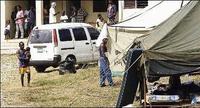Mark Titus, Freelance Writer
Haitian refugees camping at Winnifred Rest Home in Portland in this February 22, 2005. - File
WESTERN BUREAU:
When Pierre and his twin brother, Eduardo, left the shores of Anse d' Hainault in the impoverished country of Haiti in March 2003, with 11 others aboard a 30-foot boat, there was one place on their minds: the United States.
The civil unrest following Jean Bertrand Aristide's departure had led to the death of most of Pierre's family and friends.
Pierre, knowing that it would not be long before he, too, would meet his demise, paid 168 gourdes and joined a group heading to the U.S.
The journey is something he does not wish to recount, as lives were lost, including that of the boat captain. But, after spending what seemed like forever at sea, the travellers finally saw land. Their jubilation, however, was short-lived as it was not the land of opportunity; they were in Jamaica.
Being one of only four that could speak English, the next few days were hectic for Pierre - from quarantine, to interrogation by the police, to interpreting for his countrymen.
With asylum seekers from his country already repatriated by the Jamaican Government, he knew that it was just a matter of time before he and his fellow travellers too would be returning home.
Odd jobs
During their six-week stay at the Winnifred Rest Home in Portland, they were fed two meals a day. The long wait at times drove them to visit neighbouring communities to seek work.
Communities with water problems would pay them $50 to carry water for households, or $200 a day to do odd jobs on construction sites. They would also be fed or given a few items of clothing.
About three days before they were to be relocated to Montpelier in St. James, the twins ran away. They remained in Portland for about three months, but because many citizens called them Haitians, and fearing that they were becoming too conspicuous, they sought to relocate.
Assisted by their local friends, both brothers gained employment at an auto-parts junkyard in St. Mary, where they worked as casual workers in the day and security guards for the premises at night.
Worked without pay
The operators, however, refused to compensate them for their services and constantly threatened to call in the authorities. So, after two months of working without pay, they left.
Today, Pierre and Eduardo are both living in a north-coast town, and have been working with one of the country's leading security firms for more than 18 months.
Speaking with The Sunday Gleaner following the conclusion of his duties, Pierre said tha they were still without work permits, things had been going well for them, and they felt a high level of acceptance from their Jamaican counterparts.
"When we just joined (the firm), they would taunt us at times, but now they are kind to us and have accepted us as one of their own," he said.
A supervisor further described the brothers as two of the hardest workers in the firm, who have become favourites among many of their clients.
However, Pierre admitted to experiencing some anxiety since the change of government. "My greatest fear at this time is with this new government's demand that outside (foreign) workers must come forward. But up to now, my boss (has) not said anything to me, and I am not (going to) ask any questions."
He said that Eduardo, who works as a barber in his spare time, is expecting a child with his Jamaican girlfriend, but his dream is to one day become a member of the Jamaica Constabulary Force. While they still at times think about what things might have been like had they got to the United States, Pierre and Eduardo have decided to call Jamaica their home.

